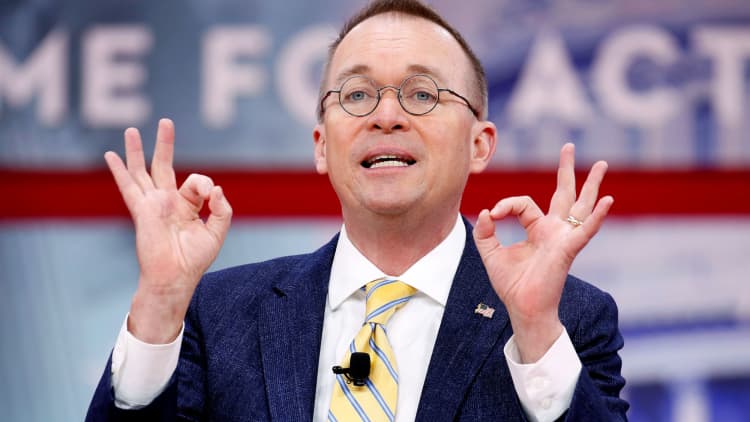
White House budget director Mick Mulvaney told CNBC on Thursday President Donald Trump won't shut down the government over the lack of border wall funding in a newly passed House spending package.
"We've decided to have that discussion after the election," Mulvaney said on "Squawk Box."
Hours before Wednesday's House spending bill vote, Trump said, "We're going to keep the government open."
Asked if the president can be taken at his word not to close the government, Mulvaney said, "I think so."
With passage now in the House and Senate, the president needs to sign the legislation before federal funding lapses at 12:01 a.m. ET Monday.
"What you saw this here is a move in the right direction," Mulvaney said. "The House and the Senate actually passed some appropriation bills, ... so it sounds like they learned to govern again."
"We still got some stuff to do in the lame duck" session of Congress after the November midterm elections, he added. "There is no money for the border security yet, and that is a problem for us."
Before joining the Trump administration, Mulvaney was a congressman from South Carolina who was a member of the hard-line conservative Freedom Caucus.
Mulvaney, also acting director of the Consumer Financial Protection Bureau, is participating in a White House economic summit on Thursday. Deregulation and tax cuts 2.0 are on the agenda.
Mulvaney also reiterated his concerns about student loans.
"Student loans still bother me," he said, but stopped short of calling for more regulations.
"The entity making the loans is one of the most irresponsible entities that could make a loan, which is the federal government," he said. "Do we need maybe more precise rules on how to do something? Maybe that's a place to start."
Earlier this month, Mulvaney said he worries about the "moral" and "financial" consequences of failing to pay back student loans.
According to data from the Federal Reserve Bank of New York, outstanding education debt in the U.S. has tripled during the last decade and now exceeds $1.5 trillion.


